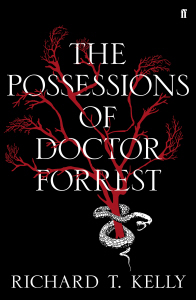 György Ligeti was born in 1923, in a village in Transylvania… Obviously there’s more to be said than just that, but it’s where I feel we should start – for Ligeti is another of the composers I leant on heavily for musical succour (or should I say terror?) while at work on The Possessions of Doctor Forrest.
György Ligeti was born in 1923, in a village in Transylvania… Obviously there’s more to be said than just that, but it’s where I feel we should start – for Ligeti is another of the composers I leant on heavily for musical succour (or should I say terror?) while at work on The Possessions of Doctor Forrest.
A Jew, Ligeti was subjected to forced labour during WWII and both his parents were sent to Auschwitz. He survived the war and studied music in Soviet-controlled Budapest, where he was influenced notably by Béla Bartók and Zoltan Kodaly, of whom we have heard recently. Ligeti escaped Hungary not long after the 1956 uprising and became an Austrian citizen, but found his great spark in the experimental music of Cologne, the city where, in 1960, Ligeti’s Apparitions was first heard. In short order he became a towering figure of the musical avant-garde, Apparitions succeeded by kindred works that came to be described as ‘sound mass compositions’: Atmosphères (1961), Requiem (1963-65) and Lontano (1967). Their eeriness, their dark radiance, is highly pronounced: certainly they are ‘dramatic’ works – they also have the power to shock. Of Atmosphères the popular American orchestral conductor Keith Lockhart remarked in 2006: ‘Any music teacher can tell you of the four main bodies of music: melody, harmony, rhythm and timbre. Ligeti, in this work, has chosen to abandon all but the latter, giving [Atmosphères] a thickness of texture that few have accomplished before.’
Lontano is one great building mood, full of dread and shudders and shivers, leading to outright terror. If you haven’t heard it in a concert hall you may well have heard it in Stanley Kubrick’s film The Shining. As usual I look to Alex Ross to say what should be said: ‘[Lontano] is a musical shadow play, in which voluptuous acts seem to be taking place behind a heavy scrim… The music hovers out of reach, teasingly imprecise, yet viscerally beautiful.’
The three great Ligeti sound-masses, bless them, are below:
Tag Archives: shining (kubrick)
April 17, 2011 · 10:13 pm


